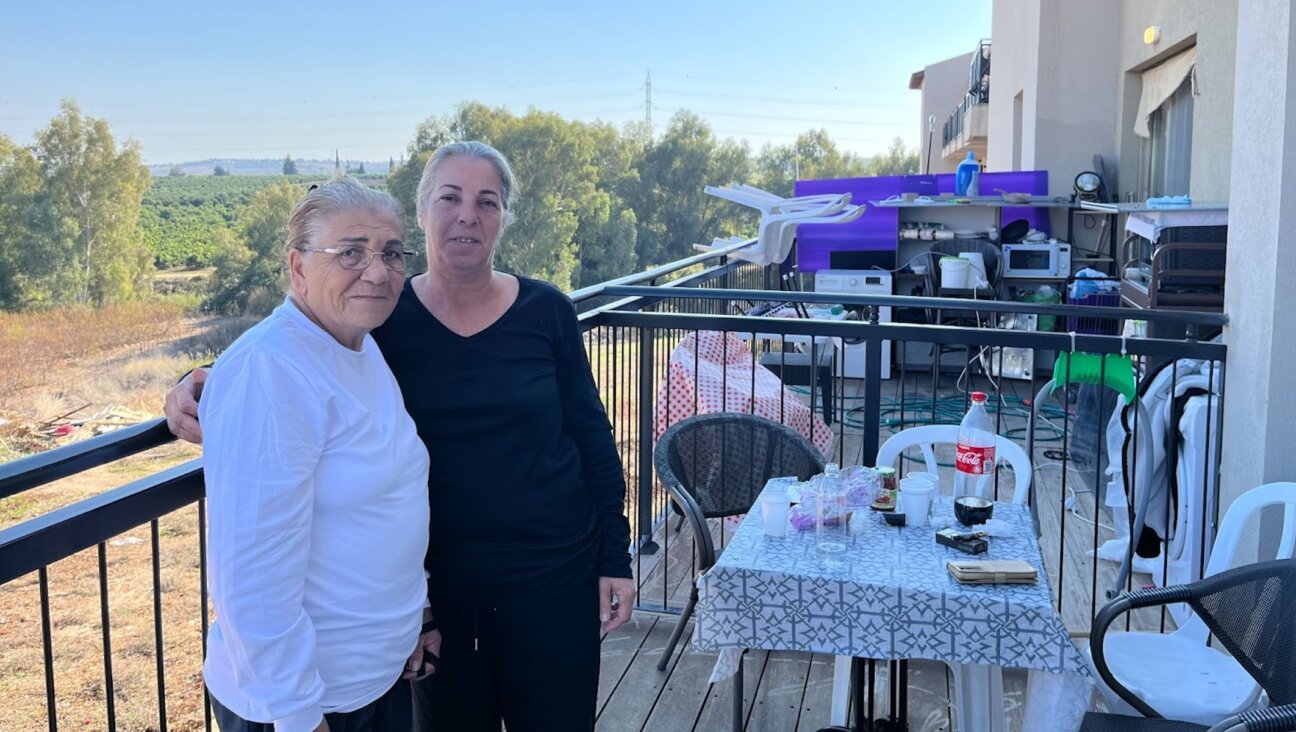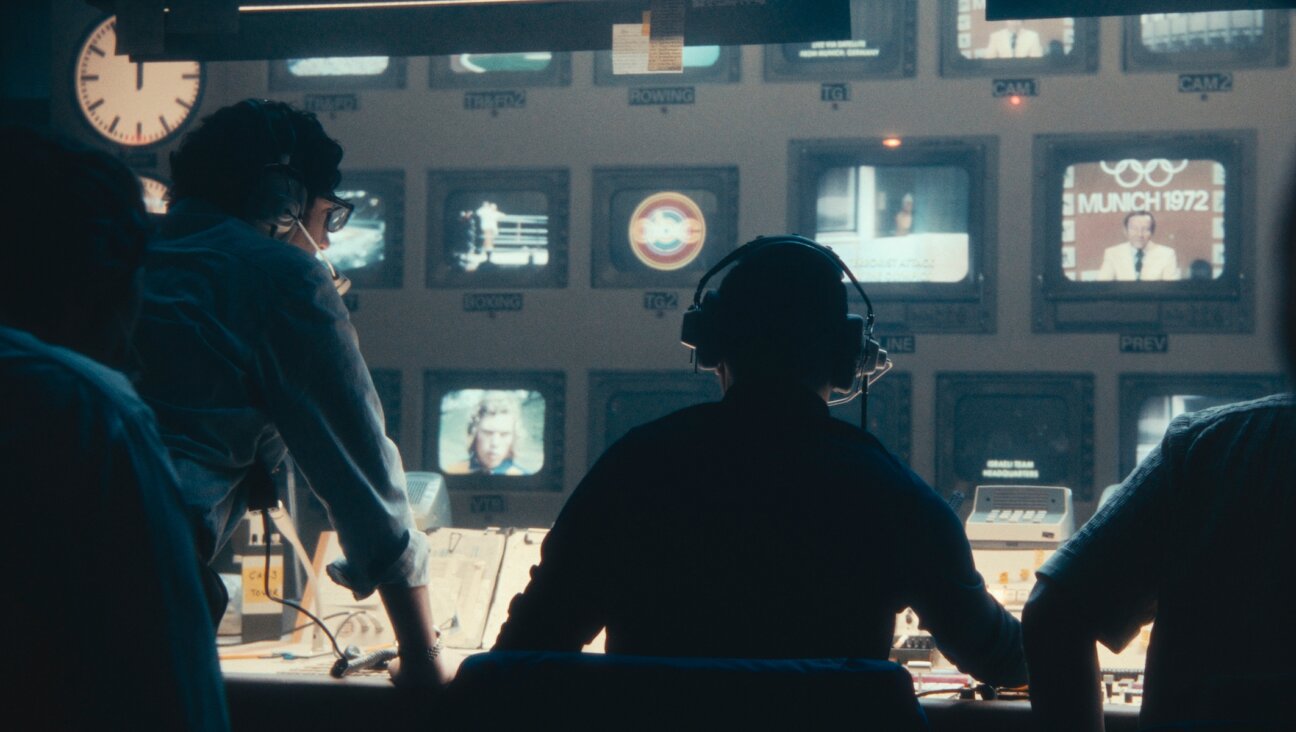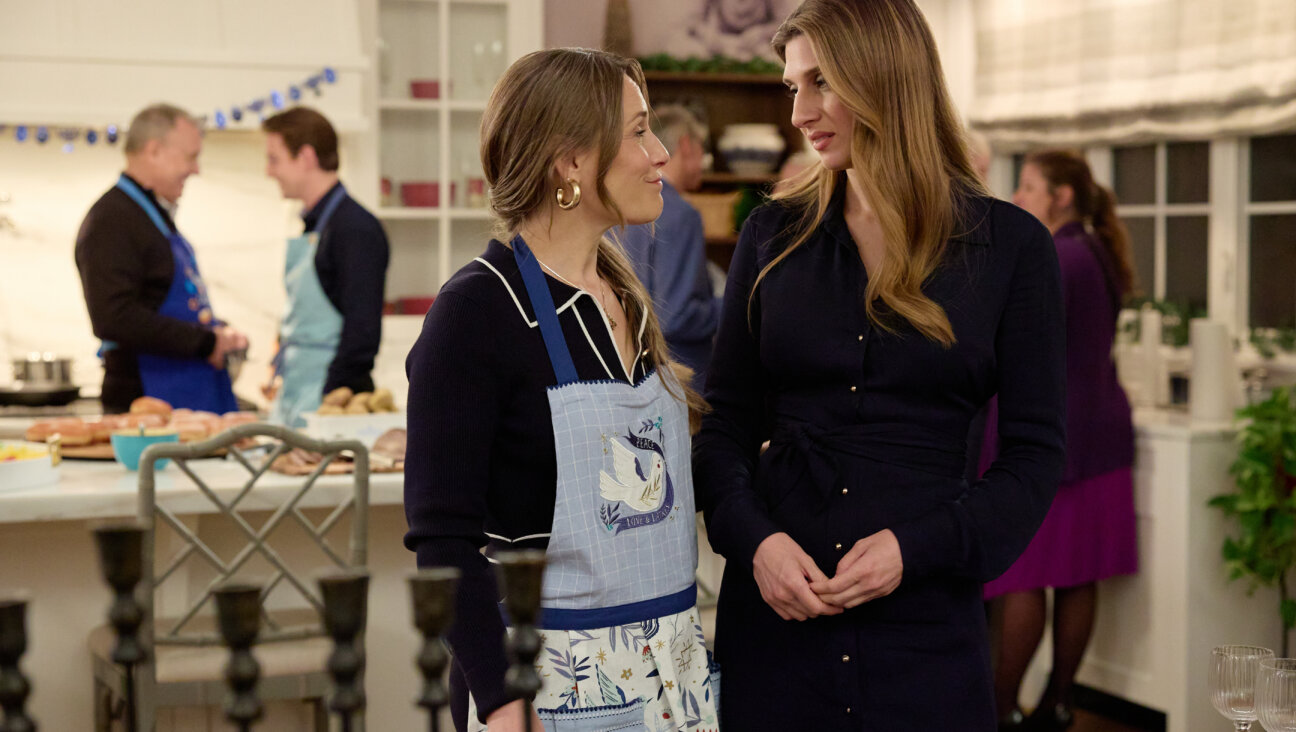Why are right wing Jews defending Sebastian Gorka, a man with ties to a Nazi-allied group?

WASHINGTON, DC – JUNE 22: White House Deputy Assistant To The President Sebastian Gorka speaks as he is interviewed by Fox News remotely from the White House June 22, 2017 in Washington, DC. Gorka discussed American Otto Warmbier’s death after his return from North Korean detention. (Photo by Alex Wong/Getty Images) Image by Getty Images
The Jews don’t agree on much these days. Our community is divided by Trump, by Israel, by questions of religious observance. But you would think that if there were one thing we could all agree upon, it would be that members of far-right military orders linked to the Nazis are bad and should be condemned.
And yet, here we are, divided even by that question. We’re divided on Sebastian Gorka, because we’re really divided on the moral lessons of the Holocaust itself.
This week, President Trump appointed Sebastian Gorka to the federal National Security Education Board, a body which makes grants and fellowships to institutions to address “the national need for experts in critical languages and regions.” Gorka, a Hungarian national who has spent the past few years hosting a right-wing radio show and contributing to right-wing media outlet Breitbart, had previously served in the Trump administration as a national security aide.
Gorka is also, as the Forward’s dogged reporting uncovered, a member of the Hungarian military order Vitézi Rend, founded by Hungarian nationalist leader Miklós Horthy, regent of Hungary from 1920 to 1944.
One of the stated goals of Vitézi Rend was to “ensure such might to the Hungarian race, which with tremendous power strikes every subversive state and anti-national movement,” and members of the order helped enforce the anti-Jewish laws imposed in Hungary by Admiral Horthy prior to World War II, and later collaborated with the Nazis during the war. Members of Vitézi Rend also received much of the property stolen from Hungarian Jews deported during the war. The U.S. Department of State classifies Vitézi Rend as an “organization under the direction of the Nazi government of Germany,” and members of this order are “presumed to be inadmissible” to the United States.
Gorka, who wore a medal linked to the military order at a Trump inaugural ball, has denied the allegations of Vitézi Rend membership, though he admits to wearing the medal to honor his father’s service in the order and membership in the Hungarian anti-Communist movement. But these denials ring a bit hollow when the order itself says it is “proud” of Gorka, and when members report that Gorka swore a lifelong loyalty oath.
You would think the Jews could all agree on condemning a military order that helped deport thousands of Hungarian Jews to concentration camps in 1944. Yet it is not hard to find defenders of Gorka in the American Jewish community. Writing in Tablet, Liel Leibovitz has defended Gorka’s choice to wear a Vitézi Rend medal as a way of honoring “the anti-Communist underground” in Hungary. Morton Klein, president of the Zionist Organization of America, hails Gorka as “a faithful friend of the State of Israel and the Jewish people” (in that order, no doubt). And when Gorka spoke at the annual Jerusalem Post conference in 2017, he was greeted with cheers and applause.
Why is it that a certain segment of the American Jewish community is willing to overlook Gorka’s well-documented links to an actual pro-Nazi military order in order to defend him? The reason has to do with the tensions of historical memory itself, and what we really talk about when we talk about learning the moral lessons from the Holocaust.
As Chemi Shalev of Ha’aretz has argued, Jews broadly adopt two approaches to the moral lessons we can learn from the Holocaust: a universalist approach and a particularist approach. According to the universalist approach, the genocide of the Jews of Europe is the most extreme example of hatred and racism against people who are different, bigotries that recur at all times, in all societies. The moral lesson is that Jews should stand with marginalized and persecuted minorities all across the world, regardless of who they are. It’s also the key to Jewish safety.
The particularist approach to the moral lessons of the Holocaust sees it differently. According to this worldview, the Holocaust was an utterly singular event of anti-Semitism and hatred of the Jews, separate from all other hatreds and persecutions. Thus, while Jews can still defend other communities when possible, our top priority should be looking out for ourselves, with a strong Jewish state.
Cory Booker urged the Jewish and Black communities to unite in fighting violence and prejudice during a candid conversation with Jodi Rudoren. Missed it? Watch here.
In other words, the dividing line is between those who say, “the world looked away while they slaughtered the Jews, therefore we need to ensure no one ever again looks away when another community is being persecuted,” and those who say, “the world looked away while they slaughtered the Jews, therefore we need to prioritize Jewish survival and not count on the rest of the world to stand with us.”
This is why Jews on the political right find it easy to defend Sebastian Gorka, despite his ties to a Nazi-aligned group. For defenders of Gorka, the world is divided into competing nationalist communities, and just as Jews should support Jewish nationalism in the form of the state of Israel, it is only natural that the Hungarian Gorka would support Hungarian nationalism, too.
For Gorka, the great moral lesson of the twentieth century is that individual nation-states are threatened by transnational ideologies, whether Communism or “radical Islam.” And nationalists should join together to defend their nations against these threatening foreign ideologies, whether they be Hungarian nationalists like Vitézi Rend, American nationalists like Donald Trump, or Israeli nationalists.
That’s why, despite his membership in a historically anti-Semitic military order, Gorka finds it easy to portray himself as a defender of the Jews against the supposed anti-Semitism of Muslim American politicians like Ilhan Omar and Rashida Tlaib. If you believe that the greatest threat to the Western world today comes from Islam, as Gorka does, then it can sometimes be convenient to portray the Jews as allies against this common enemy.
And if you’re a Jew who believes the greatest threat to the Jewish people comes from the same source, Gorka may be a similarly convenient ally. It’s the same reason the Netanyahu government has found it so easy to ally with historically anti-Semitic far-right movements in Europe, who are similarly focused on Muslim immigrants as their largest threat today, even if that means overlooking some occasional disputes about Holocaust memory.
Similarly, for Jews who adopt the universalist approach to the moral lessons of the Holocaust, Gorka is dangerous not simply because of his associations with past Nazi history. Rather, he’s dangerous because of his scapegoating of another vulnerable minority community today. He’s dangerous because of his long history of bigotry against Muslims, something Gorka’s opponents in the American Jewish community cite just as often as they cite his Nazi ties.
For Gorka, these universalist Jews aren’t really Jews at all, since they refuse to prioritize the particular needs of their own national community. That’s how we get the weird specter of a far-right Hungarian Christian claiming that a prominent Reform rabbi is not really a rabbi.
Of course, Gorka’s all-too convenient embrace of the modern state of Israel as an ally against the threat of “radical Islam” requires overlooking a lot of inconvenient facts about twentieth century history. But Gorka is all too happy to do that.
When the Trump administration released a statement on Holocaust Remembrance Day that did not mention Jews at all, leading to widespread criticism from Jewish groups, Gorka staunchly defended it, calling Jewish criticism “asinine” and “absurd.” Similarly, Gorka dismissed concerns that the far-right party he supported in Hungary stokes anti-Semitism against Hungarian Jews, calling such concerns nothing more than “the very useful tool of a certain political class,” while referring to Hungarian Jewish Holocaust victims using the euphemism “people who experienced 1944.”
If your goal is to build an alliance between far-right European nationalists and Jewish nationalists against Islam today, it’s awfully inconvenient to discuss the history between European nationalism and the Jews.
Because when American Jews debate Sebastian Gorka, we aren’t really debating Sebastian Gorka. We’re debating Jewish history, and what lessons it offers us today.
Gorka likes to defend himself against allegations of anti-Semitism by pointing out that none of the policies he advocates specifically target Jews. Which is true. But he does defend policies that target another religious minority: Muslim Americans.
And that, in turn, forces Jews to make a choice. At a time when anti-Semitism in the U.S. is at an all-time high, and Jews are feeling less secure about our place here than we have in years, do we seek safety by allying with the Christian majority, even at the cost of scapegoating another minority community? Or do we stand with another group being turned into an Other by those in power, and seek safety in solidarity?
Do we learn the particularist or the universalist moral lesson of the Holocaust?
And that’s how a debate about Jewish memory becomes a debate about the Jewish future.
Joel Swanson is a contributing columnist for the Forward and a Ph.D. student at the University of Chicago, studying modern Jewish intellectual history and the philosophy of religions. Find him on Twitter @jh_swanson.
A message from our Publisher & CEO Rachel Fishman Feddersen

I hope you appreciated this article. Before you go, I’d like to ask you to please support the Forward’s award-winning, nonprofit journalism during this critical time.
We’ve set a goal to raise $260,000 by December 31. That’s an ambitious goal, but one that will give us the resources we need to invest in the high quality news, opinion, analysis and cultural coverage that isn’t available anywhere else.
If you feel inspired to make an impact, now is the time to give something back. Join us as a member at your most generous level.
— Rachel Fishman Feddersen, Publisher and CEO

























